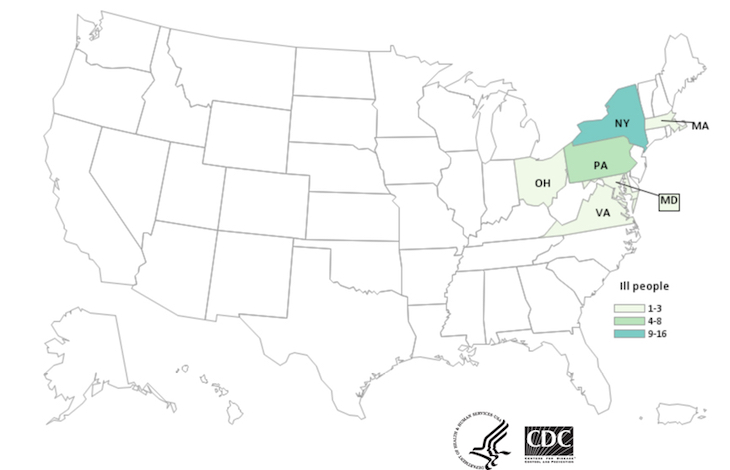The kosher chicken Salmonella outbreak that was associated with Empire Kosher brand has ended, according to the Centers for Disease Control and Prevention, with 25 patients in 6 states. Eleven people were hospitalized in this outbreak, which is a very high percentage for a Salmonella outbreak.

The Salmonella that sickened those people is Salmonella I 4,[5],12:i:-. Epidemiologic, traceback, and laboratory evidence found that some kosher chicken products were contaminated with the outbreak strain. The outbreak strain was found in samples of raw chicken collected from two facilities, including one that processes Empire Kosher brand chicken.
The case count by state is: Maryland (1), Massachusetts (2), New York (16), Ohio (1), Pennsylvania (4), and Virginia (1). Illness onset dates ranged from September 25, 2017 to August 13, 2018. The patient age range is in this kosher chicken Salmonella outbreak is from less than one year to 76. Of 22 people who were interviewed, 11, or 50%, were hospitalized.
The CDC notice contains lots of information about how consumers should protect themselves when working with raw chicken, since this product is often contaminated with pathogens. Always wash your hands before and after preparing raw chicken. Never wash raw chicken, because all you’ll end up doing is spreading pathogenic bacteria around the kitchen. Cooking is the only thing that will kill bacteria.

You can contact food safety attorney Fred Pritzker for help by calling 1-888-377-8900 if you think you are part of this Salmonella outbreak.
Juices from raw chicken are problematic, because they can easily contaminate kitchen surfaces and other foods, especially foods that are eaten raw.
Always cook chicken to 165°F, and check that temperature with a reliable food thermometer. Reheat leftovers containing chicken to that temperature too.
The symptoms of a Salmonella infection include diarrhea that may be bloody, a fever, stomach cramps, and nausea. Symptoms usually start a few hours to a few days after exposure to the pathogen. Most people recover without medical treatment, although the long term complications of this infection can include reactive arthritis and endocarditis.




